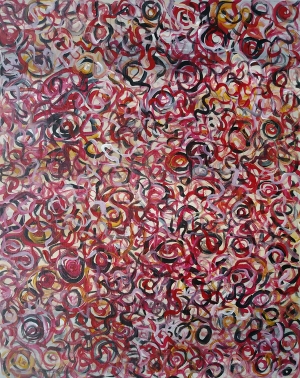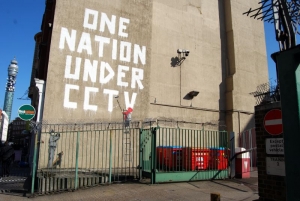
A common treasury for all: Gerrard Winstanley and the Diggers
John Storey tells the story of the 33 Digger communities, intended by Gerrard Winstanley as a first step in a revolution to change not just England but the world. Dug into the text is a poem by Fran Lock in memory of Winstanley, taken from Ruses and Fuses.
On Sunday 1 April 1649 a group of between twenty and thirty poor men and women began to dig the earth on St George’s Hill in Surrey. According to a government spy, ‘They invite all to come in and help them, and promise them meat, drink and clothes. . . . They give out, they will be four or five thousand within ten days. . . . It is feared they have some design in hand’.
The Diggers, led by Gerrard Winstanley, did have a design in hand. As Winstanley expressed it, ‘To dig up George Hill . . . we may work in righteousness and lay the foundations of making the earth a common treasury for all, both rich and poor. . . . Not enclosing any part into a particular hand, but all as one man, working together, and feeding together; . . . not one lording over another, but all looking upon each other, as equals’. Moreover, ‘every single man, male and female’ should have equal access to what is a ‘common store-house for all’.
What Winstanley envisaged was a movement from private to communal ownership. At first the two systems would co-exist, but increasingly, with the withdrawal of hired labour, the privately owned estates would cease to be viable and the communal system would prevail. As he explained,
No man can be rich, but he must be rich either by his own labours, or by the labours of other men helping him. If a man have no help from his neighbour, he shall never gather an estate of hundreds and thousands a year. If other men help him to work, then are those riches . . . the fruit of other men’s labours as well as his own.
Winstanley knew very well that ‘all rich men live at ease, feeding and clothing themselves by the labours of other men, not by their own; which is their shame, not their nobility’. And when the rich give charity, as if this justified oppression and exploitation, ‘they give away other men’s labours, not their own’. Without the labour of others, the rich would have to work the land themselves and it would become impossible for them to continue to maintain their large estates. In such circumstances, he argued, the rich would join the poor in the communal cultivation of the land. The result would be the end of private property, buying and selling, alienated labour, and the political authority which helped produce and reproduce all three.
In other words, Winstanley’s revolution does not propose to take land from the rich, but to deny to them the means to cultivate it. If the poor work together to produce for themselves, the rich will have no labour to hire and exploit. As he explains, ‘None can say, their right is taken from them; for let the rich work alone by themselves and let the poor work together by themselves; the rich in their enclosures, saying this is mine; the poor upon their commons, saying this is ours, the earth and fruits are common’. What is taken from the rich is the capacity to exploit the labour of others. If they want lots of land, let them work it by themselves. When this proves impossible, they will have to join with the new community of common ownership.
The refusal to work for the rich, and the inability of the rich to work the land themselves, would bring about the downfall of private property and class difference. The proposed mass withdrawal of labour from working the land for wages was in effect a general strike. What made it more sustainable than most general strikes, was that working for wages was being replaced by working as a community to support each other. In other words, the withdrawal of labour would produce an alternative economic and social system. Not giving hire nor taking hire would deny to the landowners the workers they needed to cultivate their estates.

The result would be that ‘No man shall have any more land than he can labour himself, or have others to labour with him in love, working together, and eating bread together . . . neither giving hire, nor taking hire’. Without workers to exploit and oppress they would have to work the land themselves. Without hired labour the large landowner would have to reduce his property to a size he could work with just family and friends. As Winstanley puts it, ‘if the rich will still hold fast this propriety of mine and thine, let them labour their own land with their own hands’. But if the rich for some reason cannot labour, providing they give up their land they will be welcomed into the community.
As he further explains, ‘He that is now a possessor of lands and riches, and cannot labour, if he say . . . take my land only let me eat bread with you, that man shall be preserved by the labours of others’. Making the additional point, in a gesture that would never be reciprocated, ‘And if any of you that are the great ones of the earth, that have been bred tenderly, and cannot work, do bring in your stock into this common treasury as an offering to the work of Righteousness; we will work for you, and you shall receive as we receive’.
The brutality of the opposition the Diggers encountered was driven by the threat they posed to the system of property ownership. It quickly became clear that the Diggers represented something new; they were not squatting in the hope that local landowners would take pity on them and allow them to stay; rather, they were challenging the very idea of land ownership.
The attack on the Diggers included an economic boycott, harassment, violent assaults by hired thugs, and legal actions. It was all organised by local landowners. They even employed a clergyman, whose sole purpose was ‘to preach down the Diggers’. The men of property were determined to prevent the Diggers establishing themselves on the commons and the example this would set. When the Diggers moved their activities to Cobham Heath in August 1649, the opposition intensified, continuing what had gone before, but now burning dwellings and furniture, and hiring thugs to chase the Diggers from the area.
turning earth
by Fran Lock
i.m Gerrard Winstanley
god holds us all in the hollow of his hand, costing
our melt-weight. from boy to man. stripling into
ingot. i see it now, we are more precious, we are
not less base. our swords, they are not morphing
into ploughshares, and every cutting blade insists
upon its own utopian intercourse. god is not found,
but made. these yeomen, apprentice lads. oh, we
have smithied his kingdom, reckoned it level with
hot, dull force. they call this treason. we’d turn
the stifled earth and let it breathe. the ground, not
broke, but opened after all. god holds us close.
they only see what we tear down. but god will
know, will know us for waywardens of the soil.
the soul. brothers, i dream of a spring without
omission, rising blue and green from winter’s
cryptic jinx. sisters, i dream of a spring without
remission; a love that shrugs the slog of mongrel
toil. god holds, god knows. man is not made
for minting open mouths. man is not made for
driving stakes into the frozen ground. they skim
the fat, we till a trough of stones. man should
be held, man should be known by what he
grows: the shoot, the word, the human good.
we planted christ. came capsized and aspiring,
sweated our tenure in stockades, and stung
into hunger, ate grass. we planted christ. not
christ as a bright dividing line, but christ, an
immovable root that binds the chalky earth
together. crisis ripens a fist like a snail in beer.
we rage and are imperfect, yet we know, we
are vouchsafed, and all are saved. for it is hope
that we make grow.
Winstanley remained convinced that ‘you lords of manors . . .have none to stand for you but whom you force by threatening’. Men pulled down the houses out of fear of what might happen to them and their families if they refused. As Winstanley explains, ‘one soldier . . . forced . . . three country men to help him pull down . . . [a] house; . . . the men were unwilling to pull it down; but for fear of their landlords, and the threatening soldier, they did but their hands to pull it down’. And when the houses were burned, tools and crops destroyed, ‘their lords gave them ten shillings to drink, and they smiled one unto another; being fearful, like a dog that is kept in awe, when his master gives him a bone, and stands over him with a whip; he will eat, and look up, and twinch his tail; for they durst not laugh out, lest their lords should hear they jeered them openly; for in their hearts they are Diggers’.
The final attack on Cobham Heath occurred on 19 April 1650. The hired thugs violently attacked men, women and children. One woman was so badly beaten that she later miscarried. Houses were burned down, crops destroyed and the Diggers forcibly dispersed. More hired thugs were paid to occupy the site to prevent their return. Local inhabitants were warned not to provide lodgings for or food to the Diggers. They had been defeated by the organised power of the local landowners: they brought the court case; they paid for the clerical attack; they hired the thugs to violently confront the Diggers and to break up their tools and destroyed their dwellings and to eventually drive them from their work on the land.
The digging on St George’s Hill, Cobham Heath and in the other 32 Digger communities was intended as a first step in a revolution to change not just England but the world. Winstanley refers to ‘our work of the earth’s community’. He also says, ‘And not only this common, or heath should be taken in and manured by the people, but all the commons and waste ground in England, and in the whole world, shall be taken in by the people in righteousness, not owning any propriety; but taking the earth to be a common treasury, as it was first made for all’.
He also knew ‘that the earth was made to be a common treasury of livelihood for all, without respect of persons, and was not made to be bought and sold . . . [and] none ought to be lords and landlords over another, but the earth is free for every son and daughter of mankind, to live free upon’. When he talked about the world being turned upside down, he really did mean the world and all who inhabit it.






